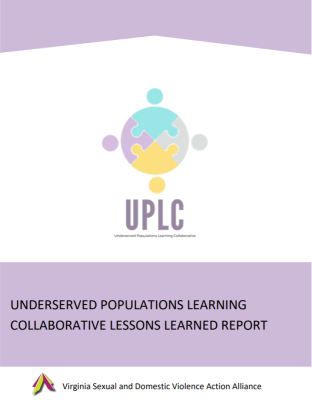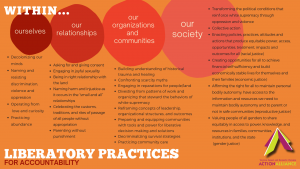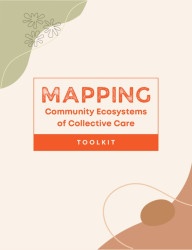Resources Library: Model Policies & Best Practices
Start a Search:
Key Elements of Addressing Gender-Based Violence on Campus
All college students have the right to learn and live in an educational environment where they are safe and treated equally. This is the overarching spirit of federal and state legislation, like Title IX, governing campus gender-based violence response and prevention efforts. It is also a core belief of the Virginia Sexual and Domestic Violence Action Alliance and our partners on Virginia’s Campus Task Force.
This resource can be used as a starting place, or a set of benchmarks, for campus advocates, police, Title IX coordinators, and administrative staff and partners who are considering how Virginia's colleges and universities can engage in comprehensive, trauma-informed, and effective responses to gender-based violence.
The Virginia Sexual and Domestic Violence Action Alliance offers the following recommendations based on more than 35 years of work with students, campuses, community advocates and national leaders dedicated to building an effective response to gender-based violence and sexual assault.
Law Enforcement Adult Sexual Assault Initial Response Checklist
This checklist is intended to be used as a tool/resource for law enforcement. It does not supersede any existing general orders, policies, or procedures, and is designed to be used in conjunction with the Virginia Department of Criminal Justice Services (DCJS) model sexual assault policy. The model policy is available on the DCJS website at www.dcjs.virginia.gov.
Lessons Learned from the Underserved Populations Learning Collaborative Project

The Underserved Populations Learning Collaborative(UPLC) was a project that approximately 40 of Virginia's member sexual and domestic violence agencies, Department of Criminal Justice Services (victim services), Virginia Department of Social Services (office of family violence), and the Action Alliance partnered, collaborated, co-learned together for over about 5 years from start to finish. This report is glimpse into some of the lessons we learned along the way, as well as the resources, presentations, and evaluations that were cultivated for this project.
Click here to download the report.
Liberatory Practices for Accountability Across the Social Ecological Model

What does accountability look like without punishment, isolation, and shaming?
What are the shifts we can make in ourselves, our relationships, communities, and as a society to move from punishment to true accountability, which builds connection and encourages growth?
This infographic, created for the Action Alliance webinar series, “Reimagining Our Legacy: Transforming from Criminalization to Liberation”, seeks to offer a few ways in which we can practice methods of accountability that liberate us from punishment and harm and move us toward healing and connection.
Mapping Community Ecosystems of Collective Care

By Shannon Perez-Darby and Andrea J. Ritchie
Since the 2020 Uprisings, there has been an explosion of interest, activity, and organizing around community-based approaches to building safer communities free from the violence of policing. Throughout this period, Interrupting Criminalization has been supporting these efforts by sharing expertise built over decades of organizing for and practicing transformative justice-based approaches to building liberatory communities with resources, toolkits, webinars, podcasts, skill-shares, trainings, cohorts, and learning and practice spaces.
In many of these spaces, and within broader campaigns and movements to divest from policing and invest in the building blocks for safer communities, critical questions and conundrums began to surface from organizers. At the core of these concerns are the questions of:
- How do we build shared definitions, values, and practices of safety across neighborhoods and organizations working within a city?
- How do we weave our small, often relatively new community safety projects — ranging from mutual aid formations, to transformative justice practitioners, to neighborhood defense organizations, to community fridges, to violence interruption and crisis response teams operating at hyper-local levels — into robust, palpable neighborhood and city-wide ecosystems of care that people can feel, trust, and rely on more fully to collectively build greater safety and wellbeing?
- How do we relate to state institutions and resources as we are doing so?
This toolkit offers some resources, responses, and additional questions to consider based on our work and practice spaces.
In particular, this toolkit emerges from the work of our Creating Community Ecosystems of Collective Care Cohort, which launched in March of 2022 and featured over a dozen organizations working in community safety coalitions in Miami, Durham, NC, Seattle, Milwaukee, Phoenix, Minneapolis, and Atlanta. This cohort consisted of groups who were already engaged in this work; it was designed as a virtual space for organizers to learn, practice, and strategize together toward building more robust community ecosystems of care at the neighborhood and city-wide levels.
In addition to breaking isolation, cross-pollinating across communities, and creating a virtual community of practice, the goal was to collectively create resources to support communities beyond the cohort who are grappling with similar questions. This toolkit is that vision come to life.
As communities face increased policing, criminalization, and organized abandonment; mounting state violence, repression, and authoritarianism; escalating white supremacist, homophobic, and transphobic violence; and climate collapse; building skilled, coordinated, expansive, and robust ecosystems of collective care is only becoming more and more essential to collective survival.

